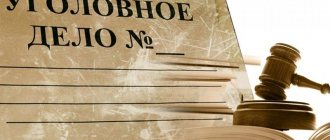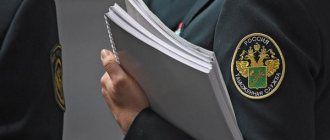Article 150 of the Code of Criminal Procedure stipulates that the integral elements of a preliminary investigation are investigation and inquiry. The choice of one of them in open criminal proceedings has a significant impact on the legality of subsequent procedural measures. Let us further consider in detail the forms of preliminary investigation, the relationship between investigation and inquiry, as well as a brief description of the judicial investigation.
Preliminary investigation
The rules governing its implementation are enshrined in Chapter 22 of the Code of Criminal Procedure.
Preliminary investigation is a mandatory form of preliminary investigation in cases of all crimes, except those specified in Part 3 of Article 150 of the Code of Criminal Procedure. As part of these proceedings, an inquiry is carried out.
As the main form of preliminary investigation, the preliminary investigation is considered as a system of procedural measures and decisions of the investigator. Their essence boils down to the acceptance of case materials for production, the implementation of procedural actions, the filing of charges, the application of coercive measures enshrined in the law, suspension, completion of the investigation, and the execution of decisions in the case.
Supervision
The system of preliminary investigation bodies is located in the prosecutor's office. Employees of departments are obliged to comply with all its instructions in one or another matter. Procedural control can also be exercised by the heads of direct investigative departments. They have the right to check the case materials, give instructions to employees on the direction of studying the crime, taking the necessary measures, bringing persons as defendants, choosing a preventive measure against detainees, the scope of the illegal act and its qualifications. All orders must be submitted in writing. However, employees can appeal them to the prosecutor. Investigators from the control and methodological department of a higher unit also have the right to carry out departmental supervision. During the consideration of cases, judicial control over the legality of the activities carried out is also carried out. Complaints about the refusal to initiate an investigation, its termination and other actions (inactions) of the prosecutor, investigator or inquiry officer that may infringe on the freedoms and rights of the parties to the proceedings or impede civilians’ access to justice are also checked.
Authorized persons
Preliminary investigation as a form of preliminary investigation has a number of specific features. The peculiarities are primarily manifested in the subject composition of the persons authorized to carry it out.
The legislation specifies specific bodies that carry out the preliminary investigation. When investigating cases of acts listed in:
- Clause 1 of Part 2 151 of the Criminal Procedure Code - investigators of the RF IC.
- P. 2 2 parts of Art. 151 are FSB investigators. The same persons are authorized to conduct a preliminary investigation in cases specified in Part 4 of Art. 151.
- Clause 3 of Part 2 of Article 151 – police investigators.
- P. 5 2 parts of Art. 151 – employees of bodies implementing the functions of control over the circulation of psychotropic and narcotic substances.
The legislation allows for the conduct of a preliminary investigation or investigation by the authorities that have identified the acts provided for in Part 5 of Art. 151 Code of Criminal Procedure. In cases defined by part 6 of the same norm, procedural activities are performed by employees of the government agency whose jurisdiction includes the acts for which criminal proceedings have been opened.
Rights and obligations
The prosecutor gives written instructions in each criminal case. Preliminary investigation bodies comply with these instructions without fail. However, there are situations when employees do not agree with one or another instruction. In this case, the investigator has the opportunity to refer the case to a higher prosecutor for consideration. In this case, the employee must express his objections in writing.
If the arguments are considered convincing, the previous orders will be canceled by the superior prosecutor. If they seem not strong enough, the case will be transferred to another employee. Preliminary investigation bodies, in addition to procedural independence, have certain powers. They have the right to give written instructions to employees of other departments on the implementation of operational investigative measures within the framework of a specific case under investigation. Resolutions adopted by the bodies carrying out the preliminary investigation are mandatory for execution by all institutions, enterprises, citizens, officials, and organizations.
General rules
The procedure for carrying out a preliminary investigation as a form of preliminary investigation is regulated by a set of norms enshrined in Articles 162-170 of the Code of Criminal Procedure.
The basis for starting procedural activity is a resolution to initiate a case or to accept materials for production. The latter occurs when the case is initiated by the investigative body.
The investigation in the preliminary investigation ends with the termination of the case (a special resolution is issued on this), the issuance of an indictment, or the sending of the proceedings to the court for a decision on the use of compulsory medical measures.
Operational search activities
The activities of preliminary investigation bodies are regulated by the Criminal Code. At the same time, operational-search activities are based on a slightly different legislative framework. In addition to the Federal Law of July 5, 1995, regulation of these activities is carried out on the basis of a number of departmental by-laws. At the same time, there are some procedural differences. Thus, the preliminary investigation bodies of the Russian Federation begin their work within the framework of the case only after its initiation. Operational search activities are not limited to this. They can be carried out even if there is information about the preparation of a crime, but without sufficient data to make a decision on initiating a case. Also, operational search activities can be carried out when there are reports of missing persons or the discovery of an unidentified corpse.
Time spending
For the preliminary investigation as a form of preliminary investigation, certain deadlines are provided. In accordance with the provisions of Article 162 of the Code of Criminal Procedure, authorized employees are required to complete procedural activities within 2 months from the date of initiation of the case. This period includes the time from the day the proceedings were opened until the day the materials were transferred to the prosecutor's office with an indictment/decree to transfer the materials to the court for the application of medical measures or until the day a decision was made to terminate the proceedings.
The period of investigation does not include the time allotted for the investigator to challenge the prosecutor’s decision to return the case to carry out an additional investigation, adjust the scope of the charge (qualification of the act) or re-draft the conclusion and eliminate the identified deficiencies. The time during which the proceedings were suspended on the grounds provided for in Article 208 of the Code of Criminal Procedure is not taken into account.
Return of materials
In the event that the court sends the case back to carry out additional investigative measures, when resuming terminated/suspended proceedings, the period is set by the decision of the prosecutor who is authorized to supervise the process - 1 month. Subsequent expansion of the period limits occurs according to the general rule. If such a need arises, the employee carrying out additional procedures within the framework of the prosecution makes a decision to extend the period of the preliminary investigation. This act must be sent to the head of his department no later than five days before the end of the previously established period. In addition, the employee is obliged to notify the accused and his defense attorney, the victim and the representative of the decision made.
Extension of period
The investigation period can be extended up to 3 months; the decision must be made by the head of the relevant body. In cases the investigation of which involves special difficulties, the period for conducting procedural measures can be extended to 12 months. The corresponding decision is made by the head of the investigative unit of the constituent entity of the Russian Federation or another leader equivalent to him, or their deputies.
Subsequent extensions of the investigation period are carried out in exceptional cases. The basis for this is a resolution of the chairman of the Investigative Committee, the head of the investigative unit of the relevant federal executive body, or their deputies.
When the case materials are returned to the investigator from the prosecutor's office in accordance with parts 1.1 of Art. 211, 1 art. 214 and paragraph 2 1 of part 221 of the Code of Criminal Procedure, the period for fulfilling the instructions of the prosecutor is determined by the head of the investigative agency that accepted the case for its proceedings. However, it cannot be more than 1 month from the date of receipt of materials.
If a terminated or suspended case is resumed or returned for additional investigation, the investigation period should not exceed 1 month. from the day it was accepted by the investigator. Subsequent increases in the term are made according to the general rules established by Article 162 of the Code of Criminal Procedure (parts 4, 5, 7).
General procedure
If there is a need to extend the period of the preliminary investigation, authorized persons must comply with procedural requirements. In particular, in order for the prosecutor of a republic, region, territory or other subject of the Russian Federation to receive a corresponding request, it, together with the materials, is sent no later than seven days before the end of the period established by law. In this case, the petition must be certified not only by the investigator, but also by the official supervising the progress of the process.
If addressed to the Prosecutor General, then it must be sent no later than 10 days. before the end of the specified period. The period for conducting a preliminary investigation when returning materials for additional study, resuming a terminated/suspended process is determined by the prosecutor performing supervision, within 1 month. Subsequent increases in the period are carried out according to general rules. If the issue is being resolved regarding the procedure within which the accused is in custody, then it is necessary to follow the procedure provided for in Article 109 of the Code of Criminal Procedure.
Features of the implementation of procedural measures
According to general rules, within the framework of a preliminary investigation carried out by an investigator, the preliminary investigation is carried out by the employee alone. At the same time, the legislation allows the implementation of procedural actions by the investigative group. This need arises when investigating particularly complex cases or when there is a large volume of procedural activities.
The head of the investigative unit makes a decision to attract a group of specialists and adjust its composition. The relevant resolution provides a list of all employees who are involved in procedural activities. The person directing and coordinating their actions must be indicated. Employees of bodies conducting operational investigative work may be involved in the work of the group.
Suspects, accused, and their representatives are familiarized with the list of employees authorized to carry out pre-trial investigations in the form of a preliminary investigation.
Primary requirements
The system of preliminary investigation bodies is endowed with certain capabilities that ensure its procedural independence. Employees have freedom to make decisions related to the progress of the proceedings and carry out necessary activities within the framework of the case. In cases provided for by law, decisions made by preliminary investigation bodies acquire force only after receiving the sanction or consent of the prosecutor or the court to take certain measures. This could be, for example, termination of a case, taking a detainee into custody, releasing the accused on bail, extending the period of his detention, a search, etc.
Final stage
A preliminary investigation as a form of preliminary investigation may result in the drawing up of an indictment if all procedural steps have been completed and the collected evidence is sufficient to bring charges. In this case, there must be no grounds for dismissing the case.
Before an authorized officer begins drawing up a conclusion, he must complete a number of mandatory procedural steps. Among them:
- Notifying the accused and explaining to him the right to familiarize himself with the case materials independently or with the help of a defense lawyer (representative). The corresponding action is documented in a protocol.
- Notification of the representative (defender), victim, civil defendant and plaintiff or their representatives.
The preliminary investigation, as the main form of preliminary investigation, thus includes many procedural actions. All of them must be recorded in the relevant protocols and regulations.
Having drawn up an indictment, the investigator immediately sends the materials to the prosecutor. Further decisions and actions in the case are regulated by the norms of Chapter 31 of the Code of Criminal Procedure.
Control Features
During the investigation, the relationship between the preliminary investigation bodies of the Russian Federation and the prosecutor's office is procedural, not administrative, in nature. Prosecutor's control does not deprive employees of independence. On the contrary, a superior official should increase it along with an increase in responsibility for the legal and timely implementation of necessary activities within the framework of the case, its disclosure, while avoiding petty supervision of a lower-ranking employee.
When the prosecutor participates in identification, inspection of the crime scene, carrying out investigative experiments, and presence during interrogations of the accused, witnesses or victims, he should not and cannot replace the investigator and take on his tasks. However, if there are questions for those being interrogated, the prosecutor can ask them. This should be reflected in the appropriate protocol. In procedural documents for any investigative action, the participation of the prosecutor is necessarily recorded.
Inquiry
Within the framework of a preliminary investigation, a preliminary investigation is not always mandatory. In cases provided for by law, an inquiry is held instead.
From a legislative point of view, the investigator is not the only entity authorized to conduct an inquiry. An investigator may also participate in the implementation of procedural actions. Meanwhile, according to a number of authors, the mention of this official seems quite doubtful. This is due to the following.
Investigation and inquiry as forms of preliminary investigation have much in common, but at the same time they are distinguished by some specific features. Thus, the investigator cannot be guided by the procedural rules provided for the interrogating officer regarding the shortened period for completing the investigation, drawing up an indictment, having it approved by the head of the inquiry agency, etc.
In the theory of criminal law, the traditional view is that within the framework of a preliminary investigation, the preliminary investigation is carried out by some subjects, and the inquiry by others. Each of them is endowed with appropriate powers. The investigation is conducted by the investigator, and the inquiry is conducted by the interrogating officer. These forms of investigation were demarcated by these and some other signs.
In cases under investigation by the inquirer, the investigator has the right to conduct an investigation, but only as a preliminary investigation. According to Part 4 of Article 150 of the Code of Criminal Procedure, by written order of the prosecutor, the cases specified in paragraph 1 of Part 3 of the same norm may be transferred for preliminary investigative measures. In practice, there have never been cases when an investigator conducted an inquiry.
Preliminary investigation and inquiry bodies: characteristics
There is quite a lot in common between these structures. In this regard, they are quite often confused. Actually, this is not surprising. Preliminary investigation and inquiry bodies have essentially the same purpose. If signs of a criminal act are identified, department employees are obliged to initiate a criminal case into this fact. Their work is based on the uniform requirements of the Code of Criminal Procedure.
Preliminary investigation bodies carry out measures to identify, verify, and record evidence. Employees also analyze them. The same tasks are performed by the bodies of inquiry. At the same time, these activities are carried out by various officials and departments regarding various crimes. Thus, the inquiry is carried out by investigators, and the preliminary investigation is conducted by investigators. They have different scope of possibilities within the framework of a criminal case.
Specifics of application of standards
The rules for conducting an inquiry are generally enshrined in parts 1 and 2 of Article 223 of the Code of Criminal Procedure. It is carried out in the manner determined by Chapters 21, 22, 24-29 with some exceptions specified in Chapter. 32 of the Code. It follows from this that the inquiry is subject to absolutely all provisions relating to the conduct of a preliminary investigation, the implementation of procedural actions, the suspension, resumption of the investigation and the termination of proceedings. If the rules established for inquiry are not consistent with the procedure for the preliminary investigation, special rules regulating this particular form of investigation are subject to application.
Actions of a law enforcement officer
After the investigation is suspended, the authorized officer notifies all participants in the process. In the notification, he must explain to them the procedure by which they can challenge this decision. In the case established by Article 208 in part 1, paragraph 1, the investigator takes the necessary measures to identify the subject who should be brought in as a suspect/accused. According to the provisions of paragraph two of this article, the employee establishes the location of the person. If the latter has disappeared, then measures are taken to find him.
General provisions
The inquiry is carried out in cases of acts of moderate and minor gravity listed in paragraph 1, paragraph 3, part 150 of Article 150 of the Code of Criminal Procedure, for which an investigation is not necessary. Also, this form of investigation can be used as part of proceedings for other crimes, but by written order of the prosecutor.
In accordance with Article 223 of the Code of Criminal Procedure, 30 days are allotted for inquiry from the date of opening the case. If there are grounds, it can be extended for no more than 30 days. The corresponding decision is made by the prosecutor. If necessary, including for conducting an examination, the period can be extended to 6 months. The district or city prosecutor, a military prosecutor equivalent to him or their deputies are authorized to make the corresponding decision. If there are exceptional circumstances related to the fulfillment of a request for legal assistance, formed and sent according to the rules of Article 453 of the Code of Criminal Procedure, the period of inquiry may be increased to 12 months. The decision on this is made by the prosecutor of the subject of the Russian Federation or a military prosecutor equivalent to him.
The role of structure
The functions of the preliminary investigation bodies include the protection of state interests, public order, civil liberties and rights. By solving cases, service employees fight crime in general. Preliminary investigation bodies are units vested with executive power. Their employees try to do everything to remain worthy of the trust of the civilian population. The tasks of the preliminary investigation authorities require the continuous expansion and interaction of existing law enforcement services, as well as the improvement of the working methods used. The leadership of the Ministry of Internal Affairs attaches great importance to the efficiency and development of the structure.
The main attention in organizing investigative activities is paid to improving the skills and professional level of employees, their ability to conduct and organize investigations efficiently and competently. Thanks to the existing legislative framework, the sphere of influence of the structure is quite wide. Thus, on the basis of jurisdiction established by regulations, employees of the structure carry out preliminary investigations in cases of more than 70% of crimes committed in the country.
Of these, more than 91% are economic offenses. Only highly qualified professionals can solve many of these cases. Employees of the structure always see their duty in the ability to adequately respond to the challenges of the time, raise their level, improve techniques and methods, and introduce scientific progress into their work. The work of investigators is hard enough. Its importance is difficult to overestimate, especially now, when crime is becoming more violent, which often manifests itself in terror and violence.
Direction of notification
In the event that a case has been initiated based on the commission of a criminal act and, as part of the investigation, a sufficient amount of information has been received that gives grounds to suspect a citizen of involvement in this attack, the legislation provides for the obligation of the investigator to draw up a special procedural document. It is a notification of suspicion of a person having committed a crime.
According to the rules enshrined in part 2 of Art. 223.1 of the Code of Criminal Procedure, this document must indicate:
- Place and date of compilation.
- Full name of the employee.
- Full name of the suspected citizen, date of birth.
- Description of the signs of the act, indicating the time and place of commission, other circumstances to be proven in accordance with paragraphs 1 and 4.1 of part 73 of the Code of Criminal Procedure.
- A specific norm of the Criminal Code, its part, clause, providing for punishment for a crime.
conclusions
Taking into account the above information, it is possible to clearly determine how a preliminary investigation differs from an investigation. The last concept is more general. It covers two types of procedural activities - inquiry, carried out primarily by investigators, and preliminary investigation.
The differences between the preliminary investigation and other types of procedural activities are obvious. The legislation clearly establishes the composition of the entities authorized to carry it out, the procedure for carrying out the necessary actions, including the collection and recording of evidence.
What features distinguish a judicial investigation from a preliminary investigation?
The procedural activities of the court, aimed at examining the evidence obtained and establishing the factual circumstances of the act, are considered the central link of legal proceedings. The judicial investigation allows you to create the foundation on which further procedures provided for by law are based. We are talking, in particular, about the debate between the parties and the passing of a verdict. The legality and validity of the final decision in the case are largely determined by the quality of the judicial investigation.
This procedural activity differs from the preliminary investigation in a number of significant features. First of all, the examination of the evidence collected in the case in court is carried out orally, publicly, directly and continuously. This allows you to recreate events as accurately as possible.
The judicial investigation cannot be considered a repetition of the preliminary investigation. It acts as an independent procedure. The examination of evidence by the court is carried out independently of the materials collected as part of the investigation.
The judicial investigation is carried out by another person - a judge. At the same time, the parties to the production take a direct and active part in it. At the same time, during the process, the simultaneous study and analysis of the collected evidence from various positions is ensured.
During the investigation, any possible versions of what happened are subject to verification. The court will follow the one reflected in the indictment. He must make a decision based on the evidence studied and analyzed at the trial.
Rights and responsibilities of the prosecutor
The actions of a superior person are considered incorrect if, while present at the crime scene during an inspection or an investigative experiment, he gives orders to the investigator, who, in turn, only carries out the procedural formalization of the actions. The prosecutor can interfere in the course of the process when the investigator commits any violations of criminal norms and the law, procedural errors, or leaves unclear circumstances that are important for the trial of the case.
If a superior official has taken over the entire production, he is responsible for the objectivity and comprehensiveness of the process. When checking a criminal case, the prosecutor pays attention to the quality of the investigation, its completeness, and gives instructions that must be followed. However, these actions should not limit the procedural independence of a lower-ranking employee. The investigator cannot be placed in such conditions under which he must carry out instructions contrary to his inner convictions.
Cases in which an employee may disagree with the instructions of the prosecutor are given in Art. 36, part 3. These include instructions on bringing a citizen to participate in the case as an accused, the scope of the charge and qualification of the crime, detention, choice of a preventive measure, sending the case to court or closing it. The above actions are considered decisive in criminal proceedings from stage to stage. However, this does not mean that the prosecutor does not have the right to resolve these issues after the completion of the investigator’s work. According to Art. 385 of the Criminal Code, after receiving the case with the indictment, he may terminate the proceedings on it for any reasons given in Art. 83, 84 CC. The prosecutor has the right to exclude certain episodes from the charge, apply a regulatory act on a less serious offense, and make other decisions within the framework of this proceeding. The implementation of the above measures is no longer associated with the principle of investigator independence in procedural terms. These decisions are made by a superior official regardless of the position of the employee, whose work is considered completed by that time. The prosecutor has the right to both participate in the preliminary investigation and inquiry, personally, if necessary, carry out certain activities, and, having initiated a case or taken it into his possession, investigate it in full independently. He certifies his participation in the events, recorded in the protocol, with his signature.
Progress of the process
Before examining the materials, the court announces the contents of the documents reflecting the accusation. Next, the order of examination of evidence is discussed and established.
The announcement of the indictment document is aimed at public communication about the subject of the proceedings.
If an inquiry or investigation into the case was not carried out, the meeting begins with the announcement of a statement from the crime victim. If there is a civil claim in the case file, its contents are also communicated to the hearing participants.
After the charges are announced, the court must find out the defendant’s attitude towards him. To do this, the presiding officer interrogates him. During the survey, it is determined whether the citizen admits himself guilty of the crime. After this, the rules for examining evidence are discussed and established.
It is worth saying that, despite the fairly detailed regulation of the procedural order of performing each judicial action, the legislation does not establish a predetermined sequence for their implementation. This is due to the specifics of evidence in each specific case.
The law provides for the court the right to independently determine at the beginning of the investigation the most appropriate procedure for studying evidence. To do this, proposals from the prosecutor, defense lawyer, defendant, civil defendant and plaintiff, victim, and their representatives on the sequence of questioning of persons involved in the proceedings (including experts and specialists) are heard. Based on the results of their study, the court issues a decision, which reflects the procedure for studying the presented materials. At any time, he can change the previously established rules, which he makes an appropriate determination about.






